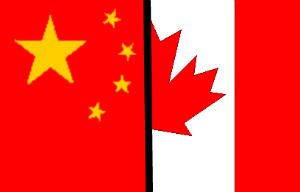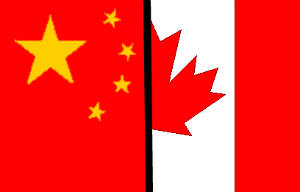
 On the morning of June 10, 2014, as my first investigative assignment as a law student volunteer working with West Coast Environmental Law, I was sent to the Federal Court of Appeal on the corner of the busy Georgia and Granville streets to observe an appeal brought by the Hupacasath First Nation (HFN), a small Vancouver Island First Nation community. Never before having been in the Federal Courts, I was excited to enter the lofty, glass office building that quite contrasts with the much lower, brick structures of the neighbouring Provincial courts. Not knowing exactly where to go, I followed a group of people dressed in suits as they entered Pacific Centre, assuming they would know where they were going. They did. As the first observer to arrive, I settled myself into the centre row with my laptop out, eager to capture the experience in writing.
On the morning of June 10, 2014, as my first investigative assignment as a law student volunteer working with West Coast Environmental Law, I was sent to the Federal Court of Appeal on the corner of the busy Georgia and Granville streets to observe an appeal brought by the Hupacasath First Nation (HFN), a small Vancouver Island First Nation community. Never before having been in the Federal Courts, I was excited to enter the lofty, glass office building that quite contrasts with the much lower, brick structures of the neighbouring Provincial courts. Not knowing exactly where to go, I followed a group of people dressed in suits as they entered Pacific Centre, assuming they would know where they were going. They did. As the first observer to arrive, I settled myself into the centre row with my laptop out, eager to capture the experience in writing.
As the appellants, lawyers for HFN were the first to address the Federal Court of Appeal, stating that they were here to argue that the federal government should consult with the Hupacasath Nation’s government before ratifying the Canada-China Foreign Investment Promotion and Protection Agreement (CCFIPPA). CCFIPPA is an investment treaty, similar to NAFTA, that puts binding obligations on host governments with respect to foreign investments.
There is widespread concern, not just for HFN, that CCFIPPA will expose Canada to lawsuits from Chinese companies and investors who claim their profits have been decreased by a particular government decision, including actions taken to meet constitutional duties and obligations to First Nations as well as environmental protection and conservation measures. As with NAFTA, these lawsuits would be decided by an extra-juridical, closed-door arbitration panel comprised of ad hoc arbitrators, not judges, appointed by the affected parties and the arbitrators’ decisions would be subject only to limited judicial review by Canadian courts. As arbitration panels are not required to provide a public record, this process lacks transparency and public accountability.
The courtroom was packed with observers, both young and old, legal and non-legal, from Port Alberni and other local and Island communities. I was there with two other West Coast volunteers and our mentor, WCEL Staff Lawyer, Eugene Kung. There were some recognizable faces in the room, including Grand Chief Stewart Phillip, fresh from leading the Protecting Our Sacred Waters from Tarsands Oil march and rally on Vancouver’s beaches two days earlier.
Interestingly, one of the three judges was the high-profile Mr. Justice Marc Nadon, whose controversial nomination to the Supreme Court of Canada by Prime Minister Harper was deemed unconstitutional by that Court last year. Also present were Mr. Justice Stratas and Mr. Justice Scott.
But what impressed upon me the most was the sense of community in the room. From the mother who brought her two young girls to witness this important legal challenge brought by Hupacasath on the behalf of all Canadians to the kind lady who brought strawberries fresh from her garden to share with other observers during the Court’s recess, there was a feeling of togetherness amongst this diverse group of people, many meeting for the first time. Those travelling from the Island the morning of the trial started as early as 4am to ensure they arrived in time to show their support to the Hupacasath cause.
The Hupacasath Appeal
HFN asks the Federal Court of Appeal to state in a “declaration” that the federal government must consult with and, if necessary, accommodate their Nation before ratifying the CCFIPPA.
HFN appeals from a decision of Chief Justice Crampton of the Federal Court Trial Division, which found that the claim was too speculative to allow for such a declaration; that is, that it was not possible to say that the rights of HFN might one-day be impacted by the treaty.
Much of the argument related to whether these types of impacts on their territory would actually occur – or whether they were mere conjecture. The lawyers for HFN, Mark Underhill and Catherine Boies Parker, explained to the court that since CCFIPPA, once ratified, will have legal effect for a minimum of 31 years, an adverse impact is highly likely even if an actual impact cannot yet be articulated. Moreover, as the protection of lands and waters from adverse effects is by nature forward-looking, the degree of speculativeness of the claim should not prevent the court from granting the declaration.
The Crown, of course, disagreed, arguing that Chief Justice Crampton correctly concluded that potential adverse impacts are too speculative in that HFN cannot establish a causal link between potential adverse impacts on HFN and the CCFIPPA. The Crown argued that hypothetical adverse impacts cannot meet the minimum threshold test that requires the adverse impact to be more than an underlying infringement of the duty to consult.
Questions from the Bench
The HFN and their supporters were likely encouraged by questions asked by Mr. Justice Stratas, who commented that until the terms of the treaty are actualized and Canada breaches its obligations to First Nations, this case can only be hypothetical. From my perspective, the judge seemed to imply that some degree of speculativeness should be permissible, but the Crown lawyer’s reply suggested he believed the judge’s comment to be merely supportive of the Crown’s own position.
Mr. Justice Stratas also asked the Crown whether it was reasonable to assume, as HFN lawyers assert, that Canada would try to avoid breaching its obligations to China under CCFIPPA in order to avoid large damage awards under the agreement and, as such, that Canada would necessarily put its CCFIPPA obligations before its obligations to First Nations. Crown lawyers replied that the Crown would rather pay damages for breaching international obligations than breach its duties to Aboriginal peoples in relation to the Honour of the Crown. Among other things, the Honour of the Crown requires the government to act with honour and integrity in the treaty-negotiating process. Accordingly, Crown lawyers insisted that the Crown will always seek to uphold its obligations and duties to Aboriginals peoples. Many of my fellow observers seemed to take issue with this assertion, shaking their heads in disagreement. Indeed, the jurisprudence of the Supreme Court of Canada has a long history of suggesting that the government has not always acted in accordance with the Honour of the Crown.
Conclusion
Irrespective of what the court decides, the Hupacasath’s appeal raises an important question as to whether and how the federal government should consult with First Nations before ratifying international treaties that could affect aboriginal rights and title. A treaty, once ratified, becomes binding on all levels of government, including provincial, territorial, municipal and Aboriginal governments. As such, consultation with these other governments, while not requisite, is undoubtedly good practice.
The federal government has a policy of consulting with provincial and territorial governments before ratifying treaties that touch on matters under their jurisdiction; however, this policy does not extend to Aboriginal governments.
In the case of CCFIPPA, the federal government consulted with provincial and territorial governments during negotiations with China. Perhaps it should be, regardless of what the Federal Court decides, that Aboriginal governments should always be consulted before the federal government ratifies a treaty that has the potential to affect their lands and waters or their abilities to self-govern.
As one pithy gentleman said as we left the courtroom this day, the theme of the case could be succinctly summed up as “consultation before ratification.”
Returning to the office with my fellow volunteers (our mentor had left to vote on the motion calling on the BC Law Society’s benchers to reject TWU’s law school), our colleagues were keen to hear our observations of the day. We were quite pleased to report that at least one judge seemed very open to HFN’s appeal, at least from our interpretations of his questions and comments. Dissecting the case and reflecting on the nature of HFN’s cause kept us busy all week. What a great experience for a new intern, observing proceedings at one of the highest levels of court in the country and getting to share her observations with her mentors and now WCEL’s readership.
By Margot Liechti, Summer Law Student Volunteer at West Coast Environmental Law
*Note: The Federal Court of Appeal reserved judgement on this matter to await submissions on whether the Court has the jurisdiction under s. 18.1(3)(b) of the Federal Courts Act 1985 to constrain a prerogative of the Crown, in this case, the treaty-making prerogative. Before ruling on whether a duty to consult is owed to HFN, the Court will first have to decide if the matter was properly brought before their court.